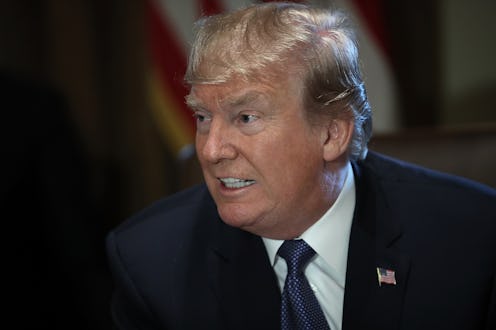News
How Trump Urging The Death Penalty For NYC's Attack Suspect Could Impact His Trial

One day after a deadly terrorist attack in New York City killed eight and injured a dozen more, President Trump tweeted the New York City suspect "should get death penalty." On Thursday morning, he repeated that call, further complicating the prosecution of the suspect and, therefore, the application the death penalty — Trump's words could make finding a jury difficult because the whole country could be biased.
The suspect, Sayfullo Saipov, 29, is currently in the hospital recovering after being shot by police at the scene. He has spoken openly with prosecutors, pledged his loyalty to ISIS, and faces federal terrorism charges. Because the charges are federal, the death penalty could be brought in his case, despite the last federal execution taking place in 2003.
Trump tweeted Wednesday night:
NYC terrorist was happy as he asked to hang ISIS flag in his hospital room. He killed 8 people, badly injured 12. SHOULD GET DEATH PENALTY!
The suspect did say that he considered hanging an ISIS flag on the truck he used to commit the attack but changed his mind, and documents reportedly stated that he wanted the flag in his hospital room, too.
On Thursday morning, Trump tweeted about the process again:
Should move fast. DEATH PENALTY!
Trump has advocated for the death penalty before. In the case of the NYC terror suspect, though, observers say his doing so could hurt the government's ability to seek the death penalty in court, as it potentially affect the jury pool. Former prosecutors, national security experts, and others have criticized his tweet on social media for that very reason.
"Mr. President, we all know he should get the death penalty. But when *you* say it, it makes it harder for DOJ to make that happen," tweeted former Chief Asst. U.S. Attorney Andrew McCarthy.
Former federal prosecutor Renato Mariotti explained why that is. "Trump helped the terrorist with this tweet," Mariotti wrote. "Now prosecutors will have to spend time dealing with motions that the jury pool is tainted."
This public support from a sitting president of the death penalty is not unheard of — although pushing for it in a specific case is unusual. President Obama ran in 2008 supporting it, and only in 2015 did he evolve to call it "deeply troubling." Presidents George W. Bush and Bill Clinton supported it. As candidate, Hillary Clinton also supported it in 2016.
But in recent memory, there hasn't been a sitting president voicing support for the practice as much as President Trump. He's all in for capital punishment.
Trump also said Wednesday that he would like to send the suspect to Guantanamo — "Send him to Gitmo — I would certainly consider that, yes," Trump told reporters.
That would be the first time a prisoner was transferred there since 2008, and no one has ever been transferred directly from U.S. soil. Trump then backtracked in his Thursday tweets, saying "statistically that process takes much longer than going through the Federal system."
There is also something appropriate about keeping him in the home of the horrible crime he committed. Should move fast. DEATH PENALTY!
That largely fits with other comments he made Wednesday. Fast and harsh seems to be his goal for the trial and punishment of the suspect.
We also have to come up with punishment that's far quicker and far greater than the punishment these animals are getting right now. They'll go through court for years. And at the end, they'll be — who knows what happens. Trump said. We need quick justice and we need strong justice. Much quicker and much stronger than we have right now.
The implications, not just for this case but for the broader criminal justice system, are huge. If another system for punishment in these cases were to develop outside the normal federal criminal justice system — be it through the military by naming the suspect an enemy combatant or with some other parallel system — the current criminal justice system and courts could be completely undermined. The power of deciding who is prosecuted and where would be undefined.
Assuming the New York City terror suspect is prosecuted in federal court, one thing remains clear: Trump's comments will likely make the prosecution more difficult, the exact opposite of what he claims to want.